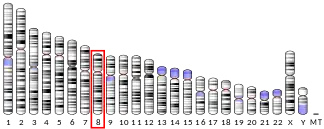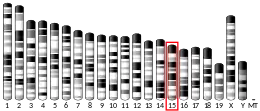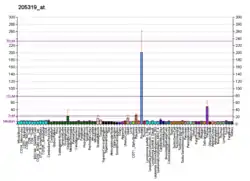PSCA (gene)
Prostate stem cell antigen is a protein that in humans is encoded by the PSCA gene.[5][6]
| PSCA | |||||||||||||||||||||||||||||||||||||||||||||||||||
|---|---|---|---|---|---|---|---|---|---|---|---|---|---|---|---|---|---|---|---|---|---|---|---|---|---|---|---|---|---|---|---|---|---|---|---|---|---|---|---|---|---|---|---|---|---|---|---|---|---|---|---|
| Identifiers | |||||||||||||||||||||||||||||||||||||||||||||||||||
| Aliases | PSCA, PRO232, prostate stem cell antigen, lncPSCA | ||||||||||||||||||||||||||||||||||||||||||||||||||
| External IDs | OMIM: 602470 MGI: 1919623 HomoloGene: 4150 GeneCards: PSCA | ||||||||||||||||||||||||||||||||||||||||||||||||||
| |||||||||||||||||||||||||||||||||||||||||||||||||||
| |||||||||||||||||||||||||||||||||||||||||||||||||||
| |||||||||||||||||||||||||||||||||||||||||||||||||||
| |||||||||||||||||||||||||||||||||||||||||||||||||||
| |||||||||||||||||||||||||||||||||||||||||||||||||||
| Wikidata | |||||||||||||||||||||||||||||||||||||||||||||||||||
| |||||||||||||||||||||||||||||||||||||||||||||||||||
This gene encodes a glycosylphosphatidylinositol-anchored cell membrane glycoprotein. In addition to being highly expressed in the prostate it is also expressed in the bladder, placenta, colon, kidney, and stomach. This gene has a nonsynonymous nucleotide polymorphism at its start codon.[6]
Clinical significance
This gene is up-regulated in a large proportion of prostate cancers and is also detected in cancers of the bladder and pancreas.[6]
Mechanism
A study reviewing the potential role of PSCA proposed that expression of the gene is regulated through the androgen receptor complex.[7] The proteins translated from the gene, is then glycosylated in the ER, and transported to the cell membrane where it is connected to a lipid.[7] This results in the formation of a GPI-anchored proteins, these proteins can be often secreted by cells or play a role in cell signaling. While, the ligand activating PSCA or the downstream physiological role has not yet been determined, because of its mechanism and over expression in prostate cancer cells, PSCA can potentially serve as a biomarker for detecting cancer.[8]
References
- GRCh38: Ensembl release 89: ENSG00000167653 - Ensembl, May 2017
- GRCm38: Ensembl release 89: ENSMUSG00000022598 - Ensembl, May 2017
- "Human PubMed Reference:". National Center for Biotechnology Information, U.S. National Library of Medicine.
- "Mouse PubMed Reference:". National Center for Biotechnology Information, U.S. National Library of Medicine.
- Reiter RE, Gu Z, Watabe T, Thomas G, Szigeti K, Davis E, et al. (February 1998). "Prostate stem cell antigen: a cell surface marker overexpressed in prostate cancer". Proceedings of the National Academy of Sciences of the United States of America. 95 (4): 1735–40. Bibcode:1998PNAS...95.1735R. doi:10.1073/pnas.95.4.1735. PMC 19171. PMID 9465086.
- "Entrez Gene: PSCA prostate stem cell antigen".
- Saeki N, Gu J, Yoshida T, Wu X (July 2010). "Prostate stem cell antigen: a Jekyll and Hyde molecule?". Clinical Cancer Research. 16 (14): 3533–8. doi:10.1158/1078-0432.CCR-09-3169. PMC 2905486. PMID 20501618.
- Kong HK, Park JH (November 2012). "Characterization and function of human Ly-6/uPAR molecules". BMB Reports. 45 (11): 595–603. doi:10.5483/bmbrep.2012.45.11.210. PMC 4133805. PMID 23186997.
Further reading
- Gu Z, Thomas G, Yamashiro J, Shintaku IP, Dorey F, Raitano A, et al. (March 2000). "Prostate stem cell antigen (PSCA) expression increases with high gleason score, advanced stage and bone metastasis in prostate cancer". Oncogene. 19 (10): 1288–96. doi:10.1038/sj.onc.1203426. PMID 10713670.
- Bahrenberg G, Brauers A, Joost HG, Jakse G (September 2000). "Reduced expression of PSCA, a member of the LY-6 family of cell surface antigens, in bladder, esophagus, and stomach tumors". Biochemical and Biophysical Research Communications. 275 (3): 783–8. doi:10.1006/bbrc.2000.3393. PMID 10973799.
- Amara N, Palapattu GS, Schrage M, Gu Z, Thomas GV, Dorey F, et al. (June 2001). "Prostate stem cell antigen is overexpressed in human transitional cell carcinoma". Cancer Research. 61 (12): 4660–5. PMID 11406532.
- Watabe T, Lin M, Ide H, Donjacour AA, Cunha GR, Witte ON, Reiter RE (January 2002). "Growth, regeneration, and tumorigenesis of the prostate activates the PSCA promoter". Proceedings of the National Academy of Sciences of the United States of America. 99 (1): 401–6. Bibcode:2002PNAS...99..401W. doi:10.1073/pnas.012574899. PMC 117572. PMID 11752398.
- Ross S, Spencer SD, Holcomb I, Tan C, Hongo J, Devaux B, et al. (May 2002). "Prostate stem cell antigen as therapy target: tissue expression and in vivo efficacy of an immunoconjugate". Cancer Research. 62 (9): 2546–53. PMID 11980648.
- Jain A, Lam A, Vivanco I, Carey MF, Reiter RE (October 2002). "Identification of an androgen-dependent enhancer within the prostate stem cell antigen gene". Molecular Endocrinology. 16 (10): 2323–37. doi:10.1210/me.2002-0004. PMID 12351697.
- Tran CP, Lin C, Yamashiro J, Reiter RE (December 2002). "Prostate stem cell antigen is a marker of late intermediate prostate epithelial cells". Molecular Cancer Research. 1 (2): 113–21. PMID 12496358.
- Clark HF, Gurney AL, Abaya E, Baker K, Baldwin D, Brush J, et al. (October 2003). "The secreted protein discovery initiative (SPDI), a large-scale effort to identify novel human secreted and transmembrane proteins: a bioinformatics assessment". Genome Research. 13 (10): 2265–70. doi:10.1101/gr.1293003. PMC 403697. PMID 12975309.
- Zhang Z, Henzel WJ (October 2004). "Signal peptide prediction based on analysis of experimentally verified cleavage sites". Protein Science. 13 (10): 2819–24. doi:10.1110/ps.04682504. PMC 2286551. PMID 15340161.
- Fraga MF, Ballestar E, Villar-Garea A, Boix-Chornet M, Espada J, Schotta G, et al. (April 2005). "Loss of acetylation at Lys16 and trimethylation at Lys20 of histone H4 is a common hallmark of human cancer". Nature Genetics. 37 (4): 391–400. doi:10.1038/ng1531. PMID 15765097. S2CID 27245550.
- Lam JS, Yamashiro J, Shintaku IP, Vessella RL, Jenkins RB, Horvath S, et al. (April 2005). "Prostate stem cell antigen is overexpressed in prostate cancer metastases". Clinical Cancer Research. 11 (7): 2591–6. doi:10.1158/1078-0432.CCR-04-1842. PMID 15814638.
- Zhigang Z, Wenlu S (December 2005). "Complete androgen ablation suppresses prostate stem cell antigen (PSCA) mRNA expression in human prostate carcinoma". The Prostate. 65 (4): 299–305. doi:10.1002/pros.20290. PMID 16015594. S2CID 1951165.
- Wente MN, Jain A, Kono E, Berberat PO, Giese T, Reber HA, et al. (August 2005). "Prostate stem cell antigen is a putative target for immunotherapy in pancreatic cancer". Pancreas. 31 (2): 119–25. doi:10.1097/01.mpa.0000173459.81193.4d. PMID 16024997. S2CID 25132037.
- Oh JH, Yang JO, Hahn Y, Kim MR, Byun SS, Jeon YJ, et al. (December 2005). "Transcriptome analysis of human gastric cancer". Mammalian Genome. 16 (12): 942–54. doi:10.1007/s00335-005-0075-2. PMID 16341674. S2CID 69278.
- Grubbs EG, Abdel-Wahab Z, Tyler DS, Pruitt SK (December 2006). "Utilizing quantitative polymerase chain reaction to evaluate prostate stem cell antigen as a tumor marker in pancreatic cancer". Annals of Surgical Oncology. 13 (12): 1645–54. doi:10.1245/s10434-006-9029-5. PMID 16957968. S2CID 8003703.
- Morgenroth A, Cartellieri M, Schmitz M, Günes S, Weigle B, Bachmann M, et al. (July 2007). "Targeting of tumor cells expressing the prostate stem cell antigen (PSCA) using genetically engineered T-cells". The Prostate. 67 (10): 1121–31. doi:10.1002/pros.20608. PMID 17492652. S2CID 30518541.




